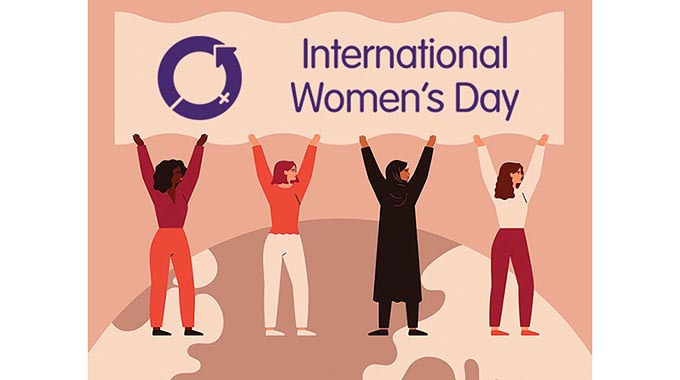Editorial Comment – IWD: Attitudes still lag the law

The International Women’s Day, celebrated yesterday, allows every country to take stock of what has been achieved in the way of women’s rights, or these days it is more on how those rights have been exercised, and on how society and cultural attitudes are changing.
At one end of the scale, legal rights, most of the world, including Zimbabwe, have long granted women full legal equality.
There are no laws that now differentiate between men and women, except at second hand in the succession to chieftainships where the law effectively states that the Government should recognise the person who succeeds under the custom of the relevant community, but those customs all produce male heirs. But that is basically it.
There are still some who try and claim that full legal rights for women is a Western phenomenon imposed on Africa. This is wrong. First the idea that women should have equal legal rights can best be described as a 20th century phenomenon, starting in the 19th century and reaching near completion in the 21st century.
One important marker is perhaps the right of women to vote. In 1900 women did not have the vote in any sovereign nation. Of the present members of the United Nations, the present list of sovereign states, one gave women the vote, New Zealand, although it was still a self-governing British colony then.
In addition two other British dependencies could count. The Isle of Man had enfranchised women property owners for the local legislative body and South Australia had given women the vote, which probably helped get all Australian women the vote within a couple of years of the new federal state being formed.
But basically the list in 1900 had one country, New Zealand. By 2000 it was simpler to list the countries where women could not vote, and that handful were all on the southern shore of the Persian or Arabian Gulf with pressures building up.
In 2015 Saudi Arabia became the last country in the world to enfranchise women, so now in every country where there are elections, women vote.
In the scale of human history the journey was very short, 122 years from 1893 when New Zealand women won the vote to 2015 when Saudi women won the vote.
And if you want to talk about customary influence, it is probably worth noting that French women and black women in the French empire were enfranchised almost simultaneously after the Second World War and that Swiss women all won the vote long after most African women were voting regularly.
Economic independence was achieved in roughly the same time frame.
British married women for example, were only legally allowed to own property and businesses, have bank accounts and spend money without their husband’s permission towards the end of the 19th century.
White Zimbabwean women won that right on 1 January 1929, although right up to independence it was quite legal in colonial Rhodesia to pay women, including white women, less than men and it was not until the 1970s that married white women could become permanent civil servants.
Black women in Zimbabwe were left behind in these advances. Come independence there was the catch up. First, in 1980, equality of wages. Then in 1982 the really crucial advance, the Legal Age of Majority Act that gave full legal and economic rights to everyone on their 18th birthday “notwithstanding any other law”.
A succession of Acts throughout the 1980s and 1990s sorted out the nuts and bolts of things like inheritance, property ownership, splitting of assets on divorce and other arcane legal practices to give practical legal effect to this legal equality, which was finally entrenched in the constitution, where it remains today.
Now the battle has shifted. Legal rights are a necessary condition, but not a sufficient condition unfortunately. There are attitudes; there are inherited practices; there are assumptions.
While Government has pushed equality hard, as a glance at the list of Ministers and permanent secretaries will show, other sections of society are not so advanced.
To take one practical example, the companies of the Zimbabwe Stock Exchange which, in theory should be searching the widest pool of talent to run these big and complex organisations.
If you arranged a dinner tonight for the chairpersons and chief executives of the more than 50 companies, you could seat all the women attending on a very small table at one side without crowding.
Yet a glance at the graduation days for universities shows the talent pool is far more evenly divided.
Statistics show that at the bottom end of the inequality scale, there are far more cases of domestic violence where a man beats a woman than the other way round.
There is still an expectation that women must run households and do most of the household chores, although in a growing percentage of younger couples this is changing. Hardly any employers offer child care or help towards child care, this being something that “the mother must arrange privately”.
When a women achieves success in some field, there are still a lot of people, and sometimes regrettably even journalists, who ask what does her husband think, does her husband approve, does her husband support her.
Yet that should be irrelevant. No one ever, ever asks if the male chief executive of a big company has the approval of his spouse. And those attitudes tend to be reflected when able women try and break into business or even the professions.
Women, and the often inadequate statistics tend to bear them out, say they find it harder to sign leases, obtain bank loans or even be taken seriously when they bid for business, Yes, things are changing, but not that fast.
The long struggle continues, to change attitudes, to adjust custom. Here we perhaps need to reflect that custom is how we act, and tradition is how our great-great grandparents acted. But our ancestors lived in a world without cars, universities, votes, running water from taps, modern media and title deeds.
None of us want to return to that world, so we need to modify and change custom to fit out new world. We can keep values, but the way we express those values and act on them must change with the insights we win from our better education, modern economies and the general progress in human existence.









Comments